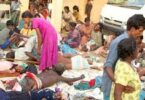Carla Dibello
There are many things I am grateful for that have come from moving to the Middle East more than 10 years ago. As an American expat, one of the things that has opened my eyes the most is the kaleidoscope of experiences and perspectives that have helped expand my horizons and ways of seeing the world. Living in the diverse city of Dubai has exposed me to a multitude of different cultures and experiences, as well as offering access to a whole host of media sources from around the world.
Watching the current situation in Gaza unfold through various news sources has been an entirely new kind of eye-opener that I have never experienced before. Flipping from one channel to the next, from Egyptian to Saudi news to the UK or US and others, the topic may be the same, but the story is entirely different – to the point where, aside from the main players, the narratives are almost unrecognizable. Bias within journalism is nothing new; it has always been there to some degree and a good journalist is one who can acknowledge their bias and work to neutralize it. But given the current state of the world and the way we communicate, it is hard to imagine this is even possible anymore.
From homogenous mainstream media coverage that operates with blinders on to doctored viral content and propaganda, the truth is nearly impossible for any of us to fully discern. But one thing should be as clear as day: the Gaza conflict is a humanitarian crisis; it is destroying everyone involved and even those who are not. Because the reality is, we are all involved in one way or another, whether we like it or not. When it comes to human life, we are all responsible. What is done to us becomes what we know. And so, we repeat it. Those who are hurt are those who hurt again. The cycle is evident on both sides, constituting an unmistakable pattern. Unimaginable violence and imprisonment create a breeding ground for desperate acts. With Gaza, the Palestinians are growing more and more desperate, in a constant state of fight or flight. The escalating and persistent violence witnessed from Israel poses a threat to the essence of the Jewish soul.
Disapproval is being communicated by more and more world leaders, including Sheikha Moza bint Nasser’s resolute resignation as a UN ambassador. An increasing number of organizations and businesses, including Huda Beauty, are expressing advocacy for humanity before financial profit. The collective global voice is getting louder, reinforcing that, even in war, there are rules. I grieve as a result of the Oct. 7 Hamas attack on Israel, mourning for the hostages and innocent lives lost. At the same time, I grieve because of the attacks on Gaza and the growing thousands of innocent Palestinian lives lost. Out of more than 14,000 Palestinian deaths, 40 percent of those killed have been children.
One of the most important life skills we as a global society have lost is understanding that two things can be true. Our world has become more and more polarized, seeing only in black and white. We tend to think, “If you are not 100 percent with us, then you are 100 percent against us.” But that is just not how life works and definitely not how anything gets resolved. It is critical that we are able to continue to communicate respectfully with those who have different perspectives from our own, instead of stonewalling or vilifying anyone who goes against the narrative of a belief system built from personal histories – even when it is incredibly painful to do so. I have lost friends whom I truly love due to conversations about Palestine. And it breaks my heart because, at the end of the day, I think we hold the same principles and values. But in this new world of ours, it is too easy to categorize anyone different as the enemy.
Organizational psychologist Adam Grant argues that the difference between belief systems and values is that, while values offer a more flexible, big-picture framework from which to operate, beliefs are a narrow and static scope that make it difficult for us to adapt to new evidence or perspectives. Identifying how the world should be according to our beliefs, rather than intrinsic values like compassion and respect, makes it easy for us to get stuck in seeing only a small part of the whole story. Too many of us are so wed to our belief systems that we abandon our actual values, leaving ourselves blind to the critical foundation of what it means to be a human being. This is not about politics. This is not about religion. This is about human life and the way we treat one another, the way we see each other and the way we communicate with each other. This is just as much anyone else’s world as it is yours or mine. And seeing it as such, even when it feels threatening to who we are and where we come from, is our only hope for a way out.
Arab News







